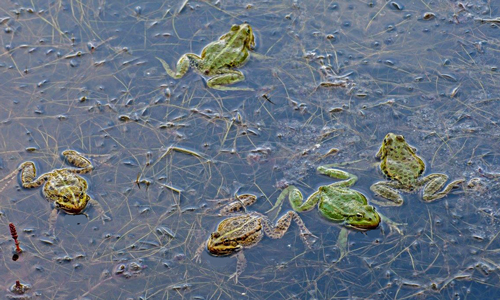You searched for:
“water”
1. A colorless liquid that falls as rain and is used for such things as drinking, taking baths, washing things, cooking, etc.; and which is essential for all living things: Water has a freezing point of O°C (32°F) and a boiling point starting at 100°C (212°F).
2. Bodies of fluids; such as, seas, lakes, rivers, or streams: Waters are particular stretches of seas or oceans; especially, those of a country; such as, American waters, Canadian waters, British waters, etc.
3. Any of the aqueous liquids that are normally secreted or that come from the body: Water comes from the bodies of many creatures; including, urine, perspiration, tears, and saliva.
3. Any of the aqueous liquids that are normally secreted or that come from the body: Water comes from the bodies of many creatures; including, urine, perspiration, tears, and saliva.
This entry is located in the following unit:
English Words in Action, Group W
(page 1)
water (verb), waters; watered, watering
1. To pour a liquid on plants to keep them alive and producing: Shirley waters her flowers at least once a day during the summer.
2. To cause aqueous fluid to form in the eyes because of irritation or tiredness: Sharon's eyes were watering because she was very tired and it caused tears to form in her eyes.
4. To give drinkable aquatic liquids to animals: The farmer waters his livestock when he feeds them.
5. To supply with fluids, as with channels, ditches, or streams: In agricultural productions, if there is not sufficient rain, then it is necessary to water the fields from the canals.
2. To cause aqueous fluid to form in the eyes because of irritation or tiredness: Sharon's eyes were watering because she was very tired and it caused tears to form in her eyes.
When Jim's father heard the sad news about his neighbor's son, his eyes started watering.
3. To form saliva in the mouth: When a person sees food, smells food, or thinks about food, the mouth begins to water; especially, when he or she is hungry.4. To give drinkable aquatic liquids to animals: The farmer waters his livestock when he feeds them.
5. To supply with fluids, as with channels, ditches, or streams: In agricultural productions, if there is not sufficient rain, then it is necessary to water the fields from the canals.
This entry is located in the following unit:
English Words in Action, Group W
(page 1)
(the science of water which denotes the study of the properties, distribution, and movements of water on land surfaces, in the soil, and through the subsurface rocks of the earth)
(a description in which plants can be produced in containers filled with water and a number of other non-soil contents)
Word Entries containing the term:
“water”
1. Aqueous liquid that is not salty: Rain is fresh water that falls as precipitation from clouds.
2. Inland bodies of unsalty aquatic fluids: Fresh water usually exists in ponds, lakes, or streams; as long as they don't contain salt.
2. Inland bodies of unsalty aquatic fluids: Fresh water usually exists in ponds, lakes, or streams; as long as they don't contain salt.
This entry is located in the following unit:
English Words in Action, Group W
(page 1)
tread water (verb), treads water; treaded water; treading water
1. To keep an upright position in deep water by moving the feet with a walking movement and the hands with a downward circular motion: Sam was treading water as a form of exercise.
2. Failing to advance or to make progress: There are some people who are treading water as they struggle to survive without jobs in these bad economic times.
2. Failing to advance or to make progress: There are some people who are treading water as they struggle to survive without jobs in these bad economic times.
This entry is located in the following unit:
English Words in Action, Group T
(page 5)
The upper level of a saturated area of soil and rock, where it meets unsaturated soil and rock below it: Water tables tend to be higher under elevated zones and lower under valleys; they may be at the surface as in the case of swamps, or thousands of feet down in reservoirs under deserts.
In dry seasons, the water table may drop several feet in some areas before rising again during the next wet season.
This entry is located in the following units:
English Words in Action, Group W
(page 1)
Ocean and Deep Sea Terms
(page 6)


